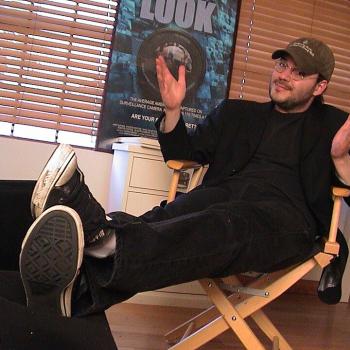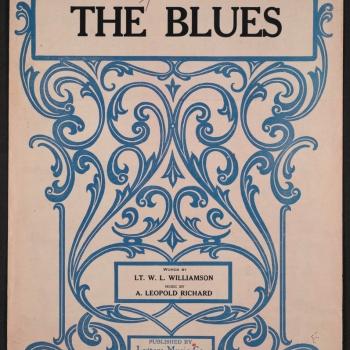
Tough times in the office.
Source: Robin Hutton on Flickr.
I grew up with Office Space (1999). It’s with us even now, the giggles to “yeah…I’m gonna have to ask you to…” and the famous printer scene (one version of which stands at over 4 million views on YouTube). Even in the book I’m reading right now about workplace massacres, Going Postal by Mark Ames, the movie is a constant refrain, serving to punctuate not just chapters, but even sections of chapters, as if Mike Judge had captured it. You know, it, like in the Ghetto Avenue Boys’ song: “You’ve got it; / you know you’ve got it, girl. / What you’ve got is it.”
But nobody talks about Jill Sprecher’s Clockwatchers (1997). What’s up with that? If you were explaining this deadpan comedy to your second-least-favorite uncle, you’d probably call it, “Office Space but with/for women.” Superficially, that’s spot on. We observe the lives of four temp office workers at a credit business in some God-forsaken middle American city that could be Memphis or Pittsburgh or Des Moines (this is the late 90s after all—the height of Clinton-era decimation of the middle of the country and its industrial centers). They stew in rage at their office; they exact some kind of revenge. Life goes on.
Deep down, though, Clockwatchers actually captures more of what (so I’m told) made 90s office culture so soul-crushing. These are temps, so they’re afforded no security (and certainly no benefits), treated like second-class citizens lest they end up stealing someone’s job. They’re women, who range from the frumpily-dressed to the scantily-clad, chasing that ever-elusive (and illusive) vanishing point at which professional, attractive, and self-respecting collide. They are expressed as people, that is, with dry, wry humor, the stuff that actual, horrific office life is made of (once you’re out).
Take the beginning of the film when the sheepish Iris (Toni Collette) arrives at her new office. She’s told to sit down and wait for the office manager. This mysterious person never comes, at least not until two hours later, when she scolds Iris for sitting around for so long. “Why didn’t you come find me?” “Maybe because I don’t know who the office manager is—and it’s your job to find me anyway!” But of course Iris doesn’t say that. She apologizes, scurries to her desk, and accepts a warning about being careful with those forms (they’re expensive!).
Or later in the movie when Margaret (Parker Posey), a rebel who puts callers on infinite hold and sees the office for the dystopian hellscape it is, gets an afterhours drink and sidles up to the buffet with Iris, the coquettish wannabe actor Paula (Lisa Kudrow), and the defeated Jane (Alanna Ubach). She is warned by a male patron that she should be careful: “those wings are hot!” She purses her lips for the tiniest bite and waves a dainty hand in front of her mouth, voice an octave higher: “oooh! You’re right! It burns! Ow! Oooow. Ow!” Revenge taken, Margaret cackles to herself and walks away.
I don’t know if comedy is the best medicine (in my opinion, that would be medicine). But an effective prop against constant degradation humor can make.
It’s this verisimilitude that so well captures what I’m reading about in Ames’ book. As someone born in the early 90s, I have never known any other kind of office culture. Ames, however, shows just how historically determined it is, how it’s only over the Reagan, Clinton, and then Bush years (the book came out in 2005) that workplaces became hyper-competitive, internally terrorized timebombs. He ties these developments to what we might now call “neoliberalism,” though we might just think of it as “when the executives get paid more, workers get paid less, reprimanded more, laid off more, and get to watch their benefits get stripped away.” First, they came for the blue-collar workers and I did nothing. Then they came for the white-collar workers and I did nothing…No wonder we had so many workplace shootings back then. One wonders about the link to school shootings now.
Part and parcel of this regime of fear is convincing workers that they cannot stand up together, that they are each an individual competing against their colleagues (even if they smile—really are obligated to smile—while doing it). Clockwatchers (and I won’t ruin what happens) even has a scene where our four main characters attempt to strike. Imagine that—temps striking. In the 90s! Ahead of its time this movie, I tell ya.
It includes the typical cast of office weirdos like office supply Obergruppenführer and foot fetishist Art (Stanley DeSantis) and his prized rubber band ball as well as neurotic executive and total incompetent Milton Lasky (Bob Balaban). There’s the new girl, an executive assistant who never worked as a temp (and thus earning the main characters’ ire), Cleo (Helen Fitzgerald), who looks a bit like if you put coke-bottle glasses on a squirrel then dressed it up as a librarian. One day she comes in in the same expensive top as Iris (which Iris “got on sale”)—a little taunt or a coincidence? Such are office politics, a gaggle of weirdos and opaque signs.
The plot is a mystery. I mean that literally: the above is hung up on a bit of intrigue. Someone is stealing things from the office and all eyes are turned on the temps to the point that their very cubicles are taken away and their desks are brought out into the open (all the better to see you with, my dear). Can our girls figure out who’s taking things from their beloved office in time? Is it the playful and (admittedly willing to occasionally steal things) Margaret all along? Can the temps old together long enough to change their lot?
Tune in to Clockwatchers (free on YouTube!) to find out.












